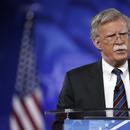John Bolton, Who Once Called for Pre-Emptive Strike on N. Korea, is Trump’s New NatSec Adviser
Here’s what you’ll find on today’s show:
— The world found out via tweet that President Trump was engaging in another White House reshuffling, this time swapping out current National Security Adviser H.R. McMaster with John Bolton, former ambassador to the United Nations. Bolton has taken a hard line in the past with respect to the foreign policy quagmires in Iran and North Korea. Instead of favoring an incremental approach, Bolton once called for a so-called ‘nosebleed’ strike against Kim Jong-Un’s regime and backed an overthrow of the current Iranian government.
— President Trump is finding himself embroiled in the repercussions of non-disclosure agreements he has reportedly been party to, some that were allegedly signed by women for their silence and others he has made White House staffers sign as a condition for working in his administration. Little is known about the actual text of these documents beyond the general principles, but legal experts are questioning whether it is possible to hold government officials to the same non-disclosure agreements that are typically reserved for the private sector.
— This week, President Trump named Dr. Robert Redfield as the new director of the Centers for Disease Control and Prevention. Redfield is a longtime H.I.V. researcher and physician based at the University of Maryland’s school of medicine. Despite his long career in research and virology, Redfield has no experience at a public health agency and has come under fire for accusations of scientific misconduct and for his past support of controversial H.I.V. policies like the forced reporting of test results and segregating H.I.V.-positive military personnel.
— In 2007, there were fewer than 400 new HIV cases in the Philippines. A decade later, that number has soared to over 11,000, an increase of 3,147 percent. The Philippines epidemic stands in stark contrast with global efforts to combat the disease, where the number of new H.I.V. cases worldwide has fallen in that same span of time. A 2017 report published by the United Nations found that the Philippines has the fastest growing rate of new H.I.V. cases in the Asia-Pacific region.
— As efforts continue across the country to address the crisis of opioid overdose deaths, a clear target has emerged: over-prescribing. President Trump spoke in New Hampshire earlier this week where he unveiled a new plan to tackle the crisis at the federal level, which included the goal of cuttingnationwide opioid prescriptions by one-third over the next three years. In some states, such as New Jersey, efforts to cut down on opioid prescriptions are already well underway. “There is a limit to the initial supply of prescription opioid pain pills to seven days,” says addiction psychiatrist Dr. Indra Cidambi. “That’s a step in the right direction, but it’s not the cure all.”
— The first pride parade in the United States was held in 1970, a year after the Stonewall riots in New York City. The parades are an annual event now happening in cities all across the country and around the world. This includes, for the first time ever, a parade in Starkville, Mississippi, this weekend. Although a permit was initially denied, the parade’s organizers brought a lawsuit against the city alleging discrimination and free speech violations, which pressured the city council into reverse its earlier decision.
